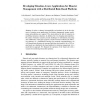Free Online Productivity Tools
i2Speak
i2Symbol
i2OCR
iTex2Img
iWeb2Print
iWeb2Shot
i2Type
iPdf2Split
iPdf2Merge
i2Bopomofo
i2Arabic
i2Style
i2Image
i2PDF
iLatex2Rtf
Sci2ools
106
click to vote
RULEML
2015
Springer
2015
Springer
Developing Situation-Aware Applications for Disaster Management with a Distributed Rule-Based platform
Abstract. In order to enhance interoperability and productivity in the development of situation-aware applications for disaster management, proper mechanisms and guidelines are required. They must address the lack of semantics in modelling emergency situations. In addition, the ever-changing and unpredictable nature of disaster scenarios present challenges for information processing and collaboration. This paper proposes a framework that combines the following elements: (i) a foundational ontology for temporal conceptualization; (ii) well-founded specifications of structural and behavioral models; (iii) a CEP engine based on a distributed rule-based platform for situation management; (iv) a model-driven approach. We illustrate the operation of the framework with a scenario for monitoring tuberculosis epidemy.
| Added | 17 Apr 2016 |
| Updated | 17 Apr 2016 |
| Type | Journal |
| Year | 2015 |
| Where | RULEML |
| Authors | João L. R. Moreira, Luís Ferreira Pires, Marten van Sinderen, Patricia Dockhorn Costa |
Comments (0)

